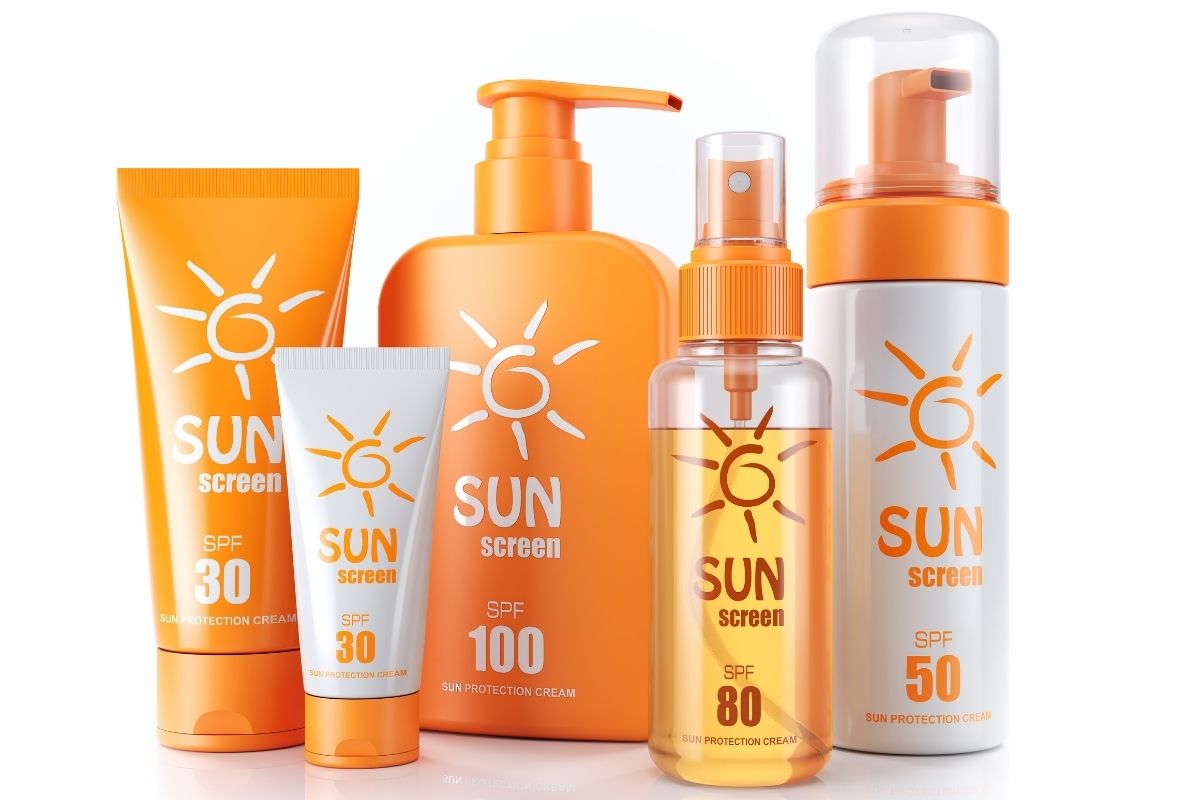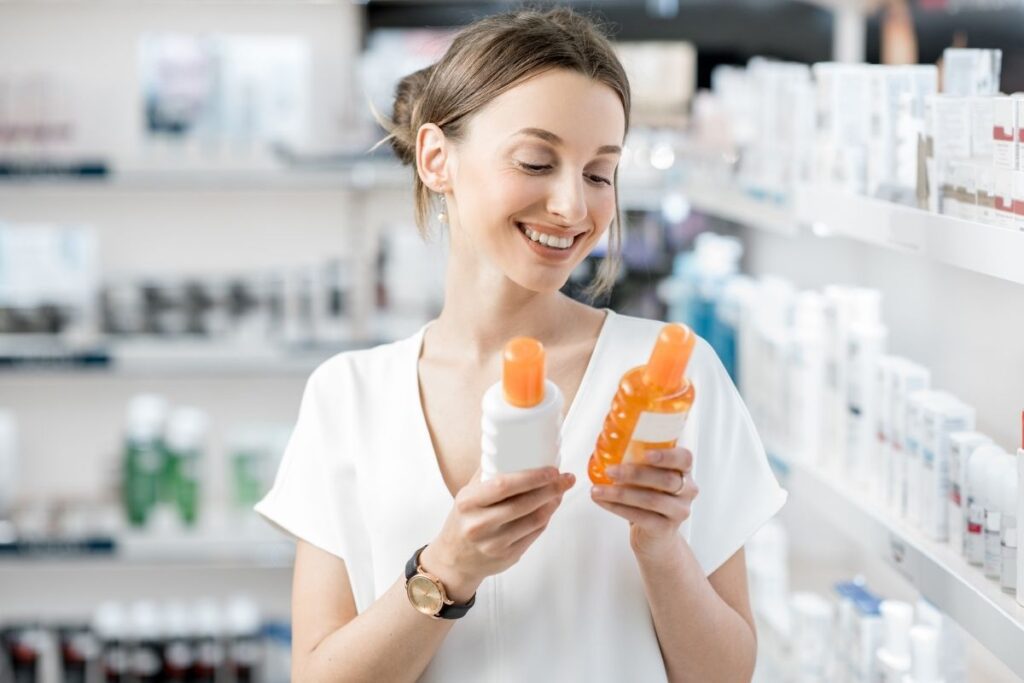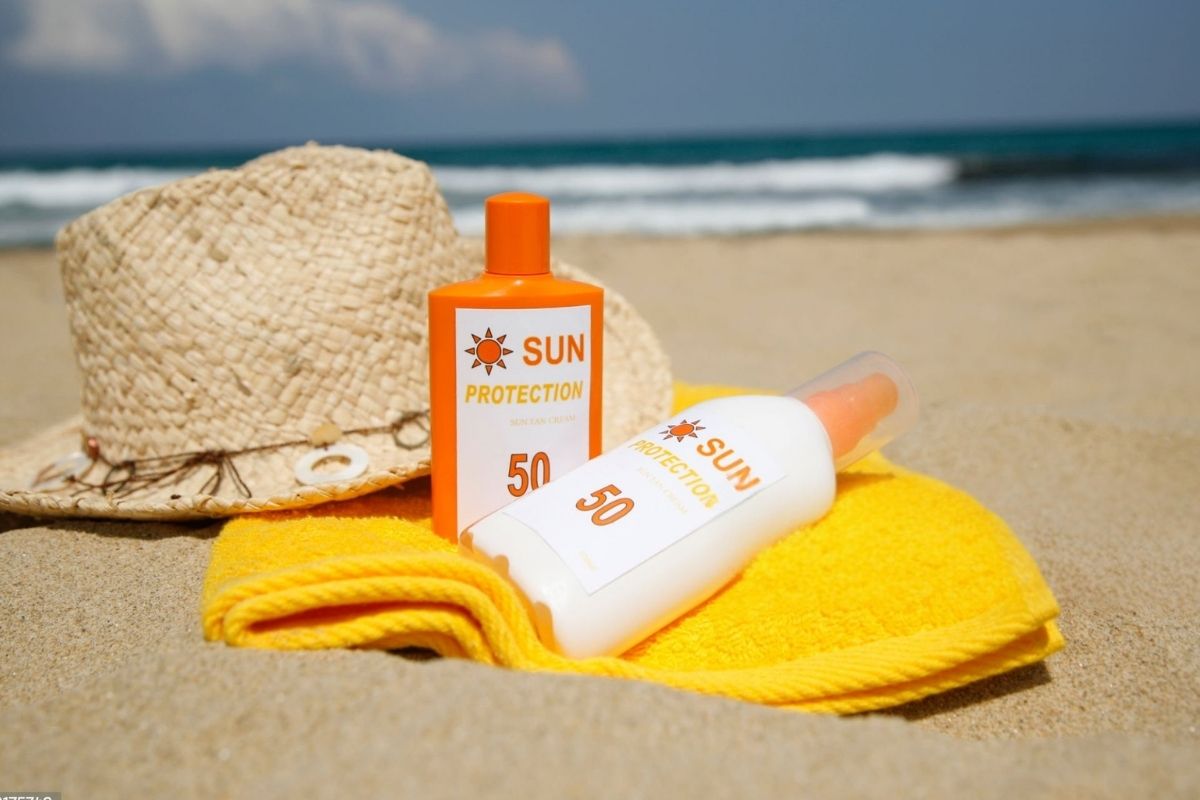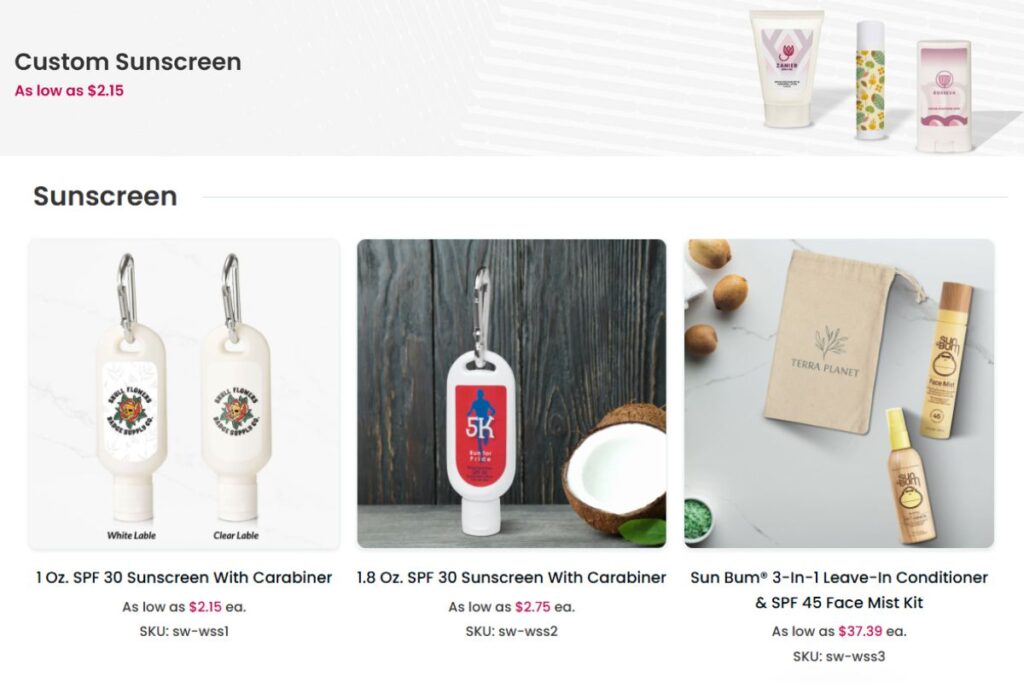Introduction
Daily sunscreen use is one of the most effective ways to protect your skin from premature aging, sunburn, hyperpigmentation, and even skin cancer. But with so many sunscreen options available, how do you choose the one that’s best for your skin?
The answer starts with understanding the two main types of sunscreen: mineral (physical) and chemical. Each works differently, feels different on the skin, and suits different lifestyles.
As a custom sunscreen seller, we believe that personalized skincare creates the most effective sun protection. In this guide, you’ll discover everything you need to know about mineral and chemical sunscreens—along with why custom sunscreen might be your best option yet.
What Is Mineral Sunscreen?
Mineral sunscreen—also known as physical sunscreen—is made from natural mineral ingredients like zinc oxide and titanium dioxide. It works by forming a protective barrier on top of the skin that reflects and scatters UV rays, preventing them from penetrating.
This type of sunscreen starts working immediately upon application, making it ideal for quick protection without a waiting period.
Best For:
- Sensitive or reactive skin
- Children and babies
- Acne-prone or eczema-prone skin
- Pregnant and nursing individuals
Pros of Mineral Sunscreen:
- Gentle and soothing on irritated skin
- Begins working immediately after application
- Less likely to clog pores or cause breakouts
- Often safer for the environment and marine life
Cons of Mineral Sunscreen:
- Can leave a visible white cast, especially on darker skin tones
- Has a thicker texture that may feel heavy for daily wear
- May rub off more easily with sweat or movement
What Is Chemical Sunscreen?
Chemical sunscreen uses synthetic active ingredients such as avobenzone, oxybenzone, and octinoxate to absorb UV rays, convert them into heat, and release that heat from the skin. This formula penetrates the skin and requires 15 to 20 minutes to become effective.
Chemical sunscreens are generally more lightweight, making them popular for everyday wear under makeup or during high-intensity activities.
Best For:
- People with darker skin tones
- Those seeking a lightweight, invisible finish
- Individuals with active lifestyles or athletes
- Makeup users who want something non-greasy
Pros of Chemical Sunscreen:
- No white residue, making it suitable for all skin tones
- Feels lighter and more elegant on the skin
- Usually more water- and sweat-resistant
- Easier to apply and reapply
Cons of Chemical Sunscreen:
- May cause irritation for sensitive skin types
- Can sting the eyes during sweaty activities
- Requires time to activate
- Some ingredients are not reef-safe
Mineral vs. Chemical: Understanding the Differences
| Aspect | Mineral Sunscreen | Chemical Sunscreen |
|---|---|---|
| Also Known As | Physical sunscreen | Organic sunscreen |
| Active Ingredients | Zinc oxide, titanium dioxide | Avobenzone, oxybenzone, octinoxate, octocrylene, etc. |
| How It Works | Sits on top of the skin and reflects UV rays | Absorbs UV rays and converts them into heat |
| Time to Effectiveness | Works immediately upon application | Requires about 15–30 minutes to become effective |
| Skin Sensitivity | Gentle; ideal for sensitive or acne-prone skin | May cause irritation or allergic reactions in some users |
| White Cast | Often leaves a visible white cast | Generally invisible on the skin |
| Water Resistance | Often more water-resistant due to thicker formula | Varies by brand; may need more frequent reapplication |
| Environmental Impact | Reef-safe and eco-friendly (if non-nano formulas are used) | Some ingredients may harm coral reefs and marine life |
| Texture | Thicker and heavier, sometimes harder to blend | Lightweight, easier to apply and absorb |
| Best For | Babies, kids, sensitive skin, and eco-conscious consumers | Everyday use, sports, and under-makeup application |
Understanding how each type of sunscreen functions helps you decide what fits best into your skincare routine. While mineral sunscreens sit on the skin’s surface to reflect UV rays, chemical sunscreens are absorbed and work from within.
Here are the core differences:
- Functionality: Mineral blocks UV rays; chemical absorbs and converts them.
- Time to Activate: Mineral works instantly; chemical requires 15–20 minutes.
- Appearance: Mineral may leave a visible white layer; chemical is transparent.
- Skin Compatibility: Mineral is better for sensitive skin; chemical suits oily skin and active users.
- Environmental Impact: Mineral formulas are generally more reef-safe.
Which Sunscreen Should You Choose?

Choosing between mineral and chemical sunscreen depends on your skin type, activity level, and personal preference. Here are a few scenarios to guide your decision:
- If you have sensitive or allergy-prone skin, mineral sunscreen is likely the safest choice.
- For daily wear under makeup, chemical sunscreen often offers a smoother finish.
- If you spend a lot of time outdoors or engage in water activities, opt for a water-resistant chemical sunscreen.
- For acne-prone or reactive skin, non-comedogenic mineral sunscreen is usually better.
- If you have a darker complexion, choose a tinted mineral sunscreen or a clear chemical formula to avoid the white cast.
Why Custom Sunscreen Is the Smartest Choice for Skin Protection
| Reason | Description |
|---|---|
| Personalized Formulation | Tailored to your skin type (dry, oily, sensitive) for optimal performance |
| Targeted SPF Protection | Choose the right SPF level for your lifestyle and environment |
| Skin-Friendly Ingredients | Avoid allergens or irritants by selecting clean, gentle ingredients |
| Branding Opportunity | Perfect for businesses—custom labels promote brand visibility and trust |
| Eco-Conscious Options | Customize with reef-safe, vegan, or cruelty-free ingredients and packaging |
| Variety of Formats | Available in lotions, sticks, sprays, and compact bottles based on user need |
| Unique Fragrances or Fragrance-Free | Tailor scent preferences or eliminate fragrance for sensitive skin |
| Custom Packaging Design | Reflects brand identity or personal style with unique labeling and colors |
| Gifting & Events | Makes thoughtful giveaways for weddings, baby showers, corporate events |
| Increased Usage Compliance | People are more likely to use sunscreen that feels good and fits their routine |
In the world of skincare, one-size-fits-all doesn’t work anymore. Your skin type, environment, lifestyle, and even your daily routine are unique to you. So why settle for a generic sunscreen that may not check all your boxes?
That’s where custom sunscreen steps in—a smarter, more tailored way to protect your skin from harmful UV rays while addressing your specific concerns. Whether you’re dealing with sensitive skin, oiliness, dry patches, acne, or hyperpigmentation, a personalized sunscreen formula is designed to meet your exact needs without compromise.
Here’s a breakdown of why more consumers and businesses are switching to custom SPF solutions:
Choose the Right Formula: Mineral, Chemical, or Hybrid

Not everyone reacts the same way to sunscreen ingredients. That’s why we offer three base options:
- Mineral Sunscreen (Physical): Ideal for sensitive or acne-prone skin, and often chosen for children, pregnant women, or reef-safe protection. Ingredients like zinc oxide and titanium dioxide sit on the skin’s surface and reflect UV rays.
- Chemical Sunscreen: Preferred for active lifestyles, darker skin tones, and daily makeup wear. Chemical formulas absorb UV rays and often feel more lightweight and invisible on the skin.
- Hybrid Sunscreen: Combines both mineral and chemical actives for balanced performance—great for people who want high protection with less white cast and a smoother finish.
Why this matters: You don’t have to compromise between safety and feel. With custom sunscreen, you pick what works best for your skin and environment.
2. Adjust the SPF Level to Match Your Lifestyle
Different lifestyles require different SPF strengths:
- SPF 30 is ideal for casual, everyday exposure like running errands or commuting.
- SPF 50 offers higher protection for extended time outdoors or moderate sun exposure.
- SPF 70 or higher is recommended for athletes, beachgoers, hikers, or anyone frequently in intense sun.
With a custom blend, you get to select your ideal SPF strength based on how, when, and where you use sunscreen. No more settling for underwhelming formulas that don’t protect you enough—or thick ones that feel like a chore to wear.
3. Pick the Format That Fits Your Routine
We all have different preferences when it comes to product application. Custom sunscreen allows you to choose from a variety of delivery formats, including:
- Lightweight Lotion: Smooth and hydrating for everyday wear.
- Gel-Based Sunscreen: Great for oily or acne-prone skin—non-greasy and absorbs quickly.
- Spray Sunscreen: Easy to apply on-the-go and perfect for reapplying at the beach or gym.
- Sunscreen Stick: Compact, travel-friendly, and excellent for targeted areas like the face, ears, or tattoos.
Why this matters: You’re more likely to use sunscreen consistently when it’s comfortable, portable, and easy to apply.
4. Add Targeted Skincare Ingredients
Your custom sunscreen can do more than protect—it can treat and improve your skin at the same time. We allow you to infuse your formula with active ingredients tailored to your skin goals:
- Vitamin E: A powerful antioxidant that helps combat free radicals and nourishes dry skin.
- Aloe Vera: Soothes irritation and hydrates sensitive or sun-exposed skin.
- Hyaluronic Acid: Locks in moisture and plumps the skin without clogging pores.
- Niacinamide: (optional) For oil control, redness reduction, and brightening.
These enhancements turn your sunscreen into a multi-tasking skincare powerhouse, making it one of the smartest additions to your routine.
5. Personalize the Texture, Scent, and Finish
Not a fan of greasy sunscreens or artificial-smelling formulas? Neither are we.
With our custom options, you can personalize your sunscreen’s texture and finish to feel exactly how you want:
- Choose between matte, satin, or dewy finishes
- Add natural essential oils for a refreshing scent—or go completely fragrance-free
- Customize the absorption speed and feel, depending on your skin type
This level of control creates a sunscreen that’s so enjoyable, you’ll actually want to reapply it—which, as we know, is key to effective sun protection.
6. Design the Packaging to Reflect Your Brand or Personality
If you’re buying for a brand, boutique, spa, wedding, or giveaway, packaging is just as important as the formula.
We offer private labeling and custom packaging options including:
- Your logo, color palette, and message on the tube, bottle, or stick
- Eco-friendly packaging made from recycled or biodegradable materials
- Travel sizes, bulk sets, and gift boxes for special occasions or retail
Whether you’re creating a product line or launching a promo item, custom sunscreen lets you showcase both quality and brand identity.
This ensures that you’re not only protected but also comfortable and confident every time you apply.
Common Myths About Sunscreen—Debunked
| Myth | Truth |
|---|---|
| “You don’t need sunscreen on cloudy days.” | Up to 80% of UV rays can pass through clouds—protection is still essential. |
| “Darker skin tones don’t need sunscreen.” | Melanin offers some protection, but all skin tones are vulnerable to UV damage and cancer. |
| “Sunscreen is only for summer.” | UV rays are present year-round, even in winter and indoor settings (via windows). |
| “Makeup with SPF is enough.” | Most makeup doesn’t provide sufficient SPF coverage or quantity—use a dedicated sunscreen. |
| “One application lasts all day.” | Sunscreen must be reapplied every 2 hours, or more often if swimming or sweating. |
| “Higher SPF means unlimited protection.” | SPF 100 doesn’t block 100% of rays—SPF 30–50 is usually sufficient with proper application. |
| “Sunscreen causes vitamin D deficiency.” | Sunscreen reduces UV exposure but doesn’t block all vitamin D synthesis—safe sun exposure still occurs. |
| “Natural or organic sunscreens don’t work.” | Many mineral (natural) sunscreens offer excellent broad-spectrum protection. |
| “Sunscreen is only for the beach or pool.” | Daily use is recommended—even during routine activities like walking or driving. |
| “All sunscreens are greasy and clog pores.” | Many modern sunscreens are lightweight, non-comedogenic, and suitable for oily or acne-prone skin. |
Let’s clear up a few misconceptions to help you make a more informed decision.
- Myth: Mineral sunscreen is always better.
Truth: Mineral is ideal for sensitive skin, but may not suit everyone due to texture or appearance. - Myth: Chemical sunscreens are toxic.
Truth: All FDA-approved sunscreen ingredients are rigorously tested and safe when used as directed. - Myth: You don’t need sunscreen on cloudy days.
Truth: UV rays can penetrate clouds, making daily use essential regardless of weather. - Myth: Higher SPF means all-day protection.
Truth: Regardless of SPF, sunscreen must be reapplied every 2 hours, especially after swimming or sweating.
Final Thoughts: The Right Sunscreen Is the One That Works for You
Both mineral and chemical sunscreens are excellent at preventing UV damage when used properly. The key is to choose the one that fits your skin type, comfort preferences, and lifestyle—and to wear it consistently.
If traditional sunscreens haven’t worked for you in the past, or if you’re tired of white cast or breakouts, it might be time to go custom.
Ready to find your perfect match?
Design your custom sunscreen with us today and experience skincare that works your way.




